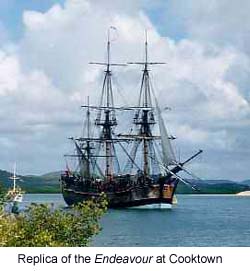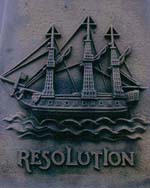Cook's Tour: Exploring "Captain Cook" Country
by Keith Kellett
 To commemorate the
achievements of James Cook, the local authorities in the area in
which he spent his early years devised a motoring trail that
links many places associated with him. If you can't, or don't
wish to drive the whole trail, a visit to only one or two of the
stops will still give an excellent insight into his life and
times. To commemorate the
achievements of James Cook, the local authorities in the area in
which he spent his early years devised a motoring trail that
links many places associated with him. If you can't, or don't
wish to drive the whole trail, a visit to only one or two of the
stops will still give an excellent insight into his life and
times.
Airy Holme Farm, near Great Ayton, lies about six miles to the
south of Middlesborough, in the north-east of England. It's not
open to visitors, but a public foot-path runs right through it.
Here, in 1735, Thomas Scottowe, the owner, noted the lively and
inquisitive mind of the 7-year-old son of his new bailiff, and
paid to send him to the village school.
The school building is still there. The lower floor is now the
Tourist Information Centre, and the upper the Captain Cook
Schoolroom Museum. On the village green stands a sculpture of
Cook as a lad, seemingly contemplating the adventures ahead.
If you feel like an easy hike, an ascent of a nearby hill called
Roseberry Topping may be of interest. Airy Holme Farm lies on its
slopes, and, on nearby Easby Moor, there's an obelisk in memory
of Cook, overlooking his boyhood haunts. Although the hill isn't
very high, it's claimed to be possible, in the right conditions,
to see in the far distance the fishing port of Staithes, where
young Cook's travels next took him.
The Cook family lived in a cottage in Bridge Street, Great Ayton.
In 1934, it, and other nearby houses, was demolished. The Cook
house was removed piecemeal, and re-erected in Fitzroy Gardens in
Melbourne, Australia. But local legend sometimes says the
Australians took the wrong one!
 The
story really began half a dozen miles away, in Marton. Today,
it's a suburb of the industrial town of Middlesborough. But when
James Cook was born on 27th October, 1728, it was just a small
farming village. The
story really began half a dozen miles away, in Marton. Today,
it's a suburb of the industrial town of Middlesborough. But when
James Cook was born on 27th October, 1728, it was just a small
farming village.
The cottage where Cook was born is gone. Its site is marked by an
iron fountain in what's now a public park. Close by stands the
Captain Cook Birthplace Museum. It opened in 1978, and displays
genuine and reproduction artifacts, in conjunction with video and
special effects, to tell the story of Cook's early life as well
as of his travels.
William Sanderson's General Store, where Cook first went to work
after leaving the farm, fell into the sea some years ago as a
result of erosion. But there's a replica of the shop, and some
Cook memorabilia, at the Captain Cook and Staithes Heritage
Centre.
The home and offices of John Walker, Cook's next employer, were
in Grape Lane, Whitby. The building still stands and is now the
Captain Cook Memorial Museum. Here, they show the attic where
Cook lived with the other apprentices. They show, also, how
Walker's coal-ships moored almost outside the house, which may
have further inspired the young man, with encouragement from his
employer, to study navigation and seamanship.
While in Whitby, we should remember that this is where the ships
in which Cook made his great voyages were built. We could hardly
forget, for many establishments in the town are named after Cook
and his ships. For example, the Endeavour and Resolution
fish-and-chip restaurant stands right next door to the
Discovery gift shop. Originally, the ships were barks, which
worked in the coal trade before being bought into the Royal Navy.
All were built at Thomas Fishburn's shipyard on the River Esk,
just upstream from the harbour. Little remains of the yard today,
except the name 'Endeavour Wharf', after Cook's first ship.
 Endeavour lives on,
in the replica launched at Fremantle, Australia in 1993 and
normally based in Sydney. There's another Endeavour, not
far away, although not a sea-going one: steel-built replica lies
at Castlegate Quay, Stockton. In spite of the omission of one of
the decks for public safety reasons, it still gives a good idea
of life on board. Endeavour lives on,
in the replica launched at Fremantle, Australia in 1993 and
normally based in Sydney. There's another Endeavour, not
far away, although not a sea-going one: steel-built replica lies
at Castlegate Quay, Stockton. In spite of the omission of one of
the decks for public safety reasons, it still gives a good idea
of life on board.
Many people regard the Resolution as Cook's more
significant ship, as it was used on two of his three voyages, and
covered many more sea-miles than Endeavour and it's the
Resolution that is shown on the plinth of Cook's statue on
Whitby's West Cliff. Right now, it can only be seen in models or
paintings in the museums. That could change, however. The
Resolution Trust is seeking funds for a sea-going replica to be
built and based at Whitby. If the enthusiastic welcome to the
Endeavour replica's visit to Whitby in 1997 is any yardstick,
the money shouldn't be too long coming!
Related Articles:
- Whitby: Town of Voyagers and Vampires, by Jane Gilbert
- https://www.timetravel-britain.com/articles/towns/whitby.shtml
- Discovering Whitby Abbey, by John Ravenscroft
- https://www.timetravel-britain.com/articles/churches/abbey.shtml
More Information:
We regret that we no longer have the resources to maintain up-to-date links and/or hours and pricing details for the various sites and attractions listed on this website. For more information about the location(s) listed above, please use your favorite search engine or visit Wikipedia.
Keith Kellett is an English freelance writer and photographer
who lives in Amesbury, England, only a short distance away from
the great stones of Stonehenge. He retired from the Royal Air
Force in 1996, since when he's spent his time travelling and
writing about or taking pictures of food and drink, old cars,
railways, steam engines, historical re-enactments, bygones,
gardens, travel, nature and the outdoors. He also likes camping
and hiking, driving, studying military and naval history,
gardening and visiting his eight grand-children.
Article and Resolution photo © 2006 Keith Kellett
Additional photos courtesy of Wikipedia.org
|
